
Plantar Warts are Caused By A Virus
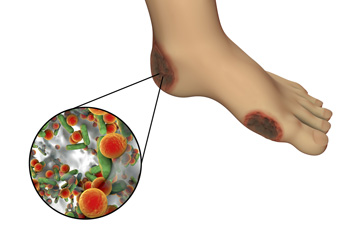 When a wart occurs on the bottom of the foot, it is called a plantar wart. Commonly affecting children and young adults, plantar warts are often extremely painful and can make walking very difficult. Caused by the human papillomavirus, the condition may originate in public showers and can develop from a poor immune system. The virus can enter the skin through small cuts on the sole of the foot but may not become visible for several weeks. Resembling a small cauliflower, a plantar wart often has small black dots in the center, which may be hemorrhages under the skin. By avoiding direct contact with infected surfaces such as public pools and shower floors, contracting the HPV virus may be prevented. Treatment may include salicylic acid, cryotherapy, or surgical removal in severe cases. A consultation with a podiatrist is important for the diagnosis and treatment of plantar warts.
When a wart occurs on the bottom of the foot, it is called a plantar wart. Commonly affecting children and young adults, plantar warts are often extremely painful and can make walking very difficult. Caused by the human papillomavirus, the condition may originate in public showers and can develop from a poor immune system. The virus can enter the skin through small cuts on the sole of the foot but may not become visible for several weeks. Resembling a small cauliflower, a plantar wart often has small black dots in the center, which may be hemorrhages under the skin. By avoiding direct contact with infected surfaces such as public pools and shower floors, contracting the HPV virus may be prevented. Treatment may include salicylic acid, cryotherapy, or surgical removal in severe cases. A consultation with a podiatrist is important for the diagnosis and treatment of plantar warts.
Plantar warts can be very uncomfortable. If you need your feet checked, contact Dr. Jordan Rachlin from Monroe Foot Care. Our doctor will assist you with all of your foot and ankle needs.
About Plantar Warts
Plantar warts are the result of HPV, or human papillomavirus, getting into open wounds on the feet. They are mostly found on the heels or balls of the feet.
While plantar warts are generally harmless, those experiencing excessive pain or those suffering from diabetes or a compromised immune system require immediate medical care. Plantar warts are easily diagnosed, usually through scraping off a bit of rough skin or by getting a biopsy.
Symptoms
- Lesions on the bottom of your feet, usually rough and grainy
- Hard or thick callused spots
- Wart seeds, which are small clotted blood vessels that look like little black spots
- Pain, discomfort, or tenderness of your feet when walking or standing
Treatment
- Freezing
- Electric tool removal
- Laser Treatment
- Topical Creams (prescription only)
- Over-the-counter medications
To help prevent developing plantar warts, avoid walking barefoot over abrasive surfaces that can cause cuts or wounds for HPV to get into. Avoiding direct contact with other warts, as well as not picking or rubbing existing warts, can help prevent the further spread of plantar warts. However, if you think you have developed plantar warts, speak to your podiatrist. He or she can diagnose the warts on your feet and recommend the appropriate treatment options.
If you have any questions please feel free to contact our office located in Monroe, NY. We offer the newest diagnostic and treatment technologies for all your foot and ankle needs.
Read more about All About Plantar WartsMaintaining Proper Foot Care
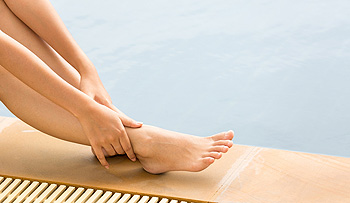 Knowing how to take care of your feet is an important step in making sure they’ll function properly and in helping to prevent foot ailments. Here are some tips that will help keep your feet going. Avoid going sockless while wearing shoes, as this increases the likelihood of getting athlete’s foot. Be sure to wear properly fitted shoes that are breathable and provide good support and comfort. Wash your feet daily to help prevent fungal infections and smelly feet. Trim your nails straight across to prevent ingrown toenails. And finally, rotate your footwear every other day to help your shoes air out.
Knowing how to take care of your feet is an important step in making sure they’ll function properly and in helping to prevent foot ailments. Here are some tips that will help keep your feet going. Avoid going sockless while wearing shoes, as this increases the likelihood of getting athlete’s foot. Be sure to wear properly fitted shoes that are breathable and provide good support and comfort. Wash your feet daily to help prevent fungal infections and smelly feet. Trim your nails straight across to prevent ingrown toenails. And finally, rotate your footwear every other day to help your shoes air out.
Everyday foot care is very important to prevent infection and other foot ailments. If you need your feet checked, contact Dr. Jordan Rachlin from Monroe Foot Care. Our doctor can provide the care you need to keep you pain-free and on your feet.
Everyday Foot Care
Often, people take care of their bodies, face and hair more so than they do for their feet. But the feet are a very important aspect of our bodies, and one that we should pay more attention to. Without our feet, we would not be able to perform most daily tasks.
It is best to check your feet regularly to make sure there are no new bruises or cuts that you may not have noticed before. For dry feet, moisturizer can easily be a remedy and can be applied as often as necessary to the affected areas. Wearing shoes that fit well can also help you maintain good foot health, as well as making it easier to walk and do daily activities without the stress or pain of ill-fitting shoes, high heels, or even flip flops. Wearing clean socks with closed shoes is important to ensure that sweat and bacteria do not accumulate within the shoe. Clean socks help to prevent Athlete’s foot, fungi problems, bad odors, and can absorb sweat.
If you have any questions please feel free to contact our office located in Monroe, NY. We offer the newest diagnostic and treatment technologies for all your foot and ankle needs.
Read more about Every Day Foot CareFoot Care Tips for Diabetics
 Foot care is extremely important for those who have diabetes. Diabetics often suffer from poor blood circulation, which means that open foot wounds, or ulcers, may heal slowly. For those who have diabetes and a foot wound, it is imperative to see a podiatrist immediately. Seeing a podiatrist regularly is an important step in maintaining proper foot health. In addition to this it is recommended that you inspect your feet daily for any abnormalities. Wearing well-fitted shoes can help prevent blisters and other foot conditions from occurring by providing adequate space for your feet. Diabetes can be a difficult condition to live with, but by following some simple health tips it can be managed.
Foot care is extremely important for those who have diabetes. Diabetics often suffer from poor blood circulation, which means that open foot wounds, or ulcers, may heal slowly. For those who have diabetes and a foot wound, it is imperative to see a podiatrist immediately. Seeing a podiatrist regularly is an important step in maintaining proper foot health. In addition to this it is recommended that you inspect your feet daily for any abnormalities. Wearing well-fitted shoes can help prevent blisters and other foot conditions from occurring by providing adequate space for your feet. Diabetes can be a difficult condition to live with, but by following some simple health tips it can be managed.
Diabetic foot care is important in preventing foot ailments such as ulcers. If you are suffering from diabetes or have any other concerns about your feet, contact Dr. Jordan Rachlin from Monroe Foot Care. Our doctor can provide the care you need to keep you pain-free and on your feet.
Diabetic Foot Care
Diabetes affects millions of people every year. The condition can damage blood vessels in many parts of the body, especially the feet. Because of this, taking care of your feet is essential if you have diabetes, and having a podiatrist help monitor your foot health is highly recommended.
The Importance of Caring for Your Feet
- Routinely inspect your feet for bruises or sores.
- Wear socks that fit your feet comfortably.
- Wear comfortable shoes that provide adequate support.
Patients with diabetes should have their doctor monitor their blood levels, as blood sugar levels play such a huge role in diabetic care. Monitoring these levels on a regular basis is highly advised.
It is always best to inform your healthcare professional of any concerns you may have regarding your feet, especially for diabetic patients. Early treatment and routine foot examinations are keys to maintaining proper health, especially because severe complications can arise if proper treatment is not applied.
If you have any questions please feel free to contact our office located in Monroe, NY. We offer the newest diagnostic and treatment technologies for all your foot and ankle needs.
Read more about How to Care for Diabetic FootThat Pain in Your Feet May be Plantar Fasciitis
 Plantar fasciitis, a condition caused by the tearing and inflammation of the plantar fascia tissue in the bottom of the foot, is a relatively common foot problem. Symptoms are characterized by pain in the heel of the foot. If you are experiencing plantar fasciitis, it may hurt in the morning when you take your first steps. Anti-inflammatory medication may help reduce the pain and inflammation, and rest is a good way to help treat the condition. However, it is recommended to see a podiatrist who can diagnose and provide more thorough care. A podiatrist may offer custom-made orthotics to help provide cushion and support for the foot. A change in footwear can also help as well, as can losing weight if you are overweight. If you stand a lot for your job, it is advised that you take more breaks to help take the pressure off your feet throughout the day.
Plantar fasciitis, a condition caused by the tearing and inflammation of the plantar fascia tissue in the bottom of the foot, is a relatively common foot problem. Symptoms are characterized by pain in the heel of the foot. If you are experiencing plantar fasciitis, it may hurt in the morning when you take your first steps. Anti-inflammatory medication may help reduce the pain and inflammation, and rest is a good way to help treat the condition. However, it is recommended to see a podiatrist who can diagnose and provide more thorough care. A podiatrist may offer custom-made orthotics to help provide cushion and support for the foot. A change in footwear can also help as well, as can losing weight if you are overweight. If you stand a lot for your job, it is advised that you take more breaks to help take the pressure off your feet throughout the day.
Plantar fasciitis can be very painful and inconvenient. If you are experiencing heel pain or symptoms of plantar fasciitis, contact Dr. Jordan Rachlin from Monroe Foot Care. Our doctor can provide the care you need to keep you pain-free and on your feet.
What is Plantar Fasciitis?
Plantar fasciitis is the inflammation of the thick band of tissue that runs along the bottom of your foot, known as the plantar fascia, and causes mild to severe heel pain.
What Causes Plantar Fasciitis?
- Excessive running
- Non-supportive shoes
- Overpronation
- Repeated stretching and tearing of the plantar fascia
How Can It Be Treated?
- Conservative measures – anti-inflammatories, ice packs, stretching exercises, physical therapy, orthotic devices
- Shockwave therapy – sound waves are sent to the affected area to facilitate healing and are usually used for chronic cases of plantar fasciitis
- Surgery – usually only used as a last resort when all else fails. The plantar fascia can be surgically detached from the heel
While very treatable, plantar fasciitis is definitely not something that should be ignored. Especially in severe cases, speaking to your doctor right away is highly recommended to avoid complications and severe heel pain. Your podiatrist can work with you to provide the appropriate treatment options tailored to your condition.
If you have any questions please feel free to contact our office located in Monroe, NY. We offer the newest diagnostic and treatment technologies for all your foot and ankle needs.
Read more about Plantar FasciitisWhat are Flat Feet and How is It Treated?
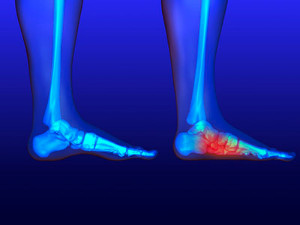 Pes planus, better known as flat feet, is a common medical condition in the United States with some experts placing the number of affected people near 25 percent of the population. Flat feet do not cause any symptoms in most cases and can be inherited. The posterior tibial tendon is what holds up the arch of the foot. When the posterior tibial tendon becomes damaged, either from trauma, degeneration, or stress, it stretches and sags. This causes the feet to lose their arch and become flat. Inflammation and pain can occur if the tendon has tears. Treatment requires a podiatrist who can observe the foot and prescribe solutions such as ice, rest, elevation, compression, anti-inflammatory medication, or even a cast in some cases. Orthotics can provide better support for the foot, and physical therapy may be prescribed as well. If nothing works, surgery may be necessary.
Pes planus, better known as flat feet, is a common medical condition in the United States with some experts placing the number of affected people near 25 percent of the population. Flat feet do not cause any symptoms in most cases and can be inherited. The posterior tibial tendon is what holds up the arch of the foot. When the posterior tibial tendon becomes damaged, either from trauma, degeneration, or stress, it stretches and sags. This causes the feet to lose their arch and become flat. Inflammation and pain can occur if the tendon has tears. Treatment requires a podiatrist who can observe the foot and prescribe solutions such as ice, rest, elevation, compression, anti-inflammatory medication, or even a cast in some cases. Orthotics can provide better support for the foot, and physical therapy may be prescribed as well. If nothing works, surgery may be necessary.
Flatfoot is a condition many people suffer from. If you have flat feet, contact Dr. Jordan Rachlin from Monroe Foot Care. Our doctor will treat your foot and ankle needs.
What are Flat Feet?
Flatfoot is a condition in which the arch of the foot is depressed and the sole of the foot is almost completely in contact with the ground. About 20-30% of the population generally has flat feet because their arches never formed during growth.
Conditions & Problems:
Having flat feet makes it difficult to run or walk because of the stress placed on the ankles.
Alignment – The general alignment of your legs can be disrupted, because the ankles move inward which can cause major discomfort.
Knees – If you have complications with your knees, flat feet can be a contributor to arthritis in that area.
Symptoms:
- Pain around the heel or arch area
- Trouble standing on the tip toe
- Swelling around the inside of the ankle
- Flat look to one or both feet
- Having your shoes feel uneven when worn
Treatment:
If you are experiencing pain and stress on the foot you may weaken the posterior tibial tendon, which runs around the inside of the ankle.
If you have any questions please feel free to contact one of our office located in Monroe, NY. We offer the newest diagnostic and treatment technologies for all your foot and ankle needs.
Read more about Flat FeetStudy Finds that Achilles and Bone Injuries More Likely to Occur in Track and Field Events
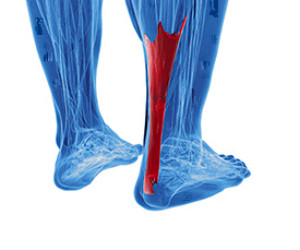 A study conducted by the Boston University School of Medicine found that the tendons and bones in the lower extremities of Olympic female athletes were more likely to become injured in track and field events than other events. 25 bone stress injuries and 156 tendon abnormalities that developed during the 2016 Summer Olympics were examined in the study. The results found that bone stress injuries were more common in women and in the lower extremities. Researchers hope to use this information to help prevent any future bone stress injuries in athletic activities. For tendons, researchers hope that the information will help identify chronic lesions and any preventative measures.
A study conducted by the Boston University School of Medicine found that the tendons and bones in the lower extremities of Olympic female athletes were more likely to become injured in track and field events than other events. 25 bone stress injuries and 156 tendon abnormalities that developed during the 2016 Summer Olympics were examined in the study. The results found that bone stress injuries were more common in women and in the lower extremities. Researchers hope to use this information to help prevent any future bone stress injuries in athletic activities. For tendons, researchers hope that the information will help identify chronic lesions and any preventative measures.
Achilles tendon injuries need immediate attention to avoid future complications. If you have any concerns, contact Dr. Jordan Rachlin of Monroe Foot Care. Our doctor can provide the care you need to keep you pain-free and on your feet.
What is the Achilles Tendon?
The Achilles tendon is a tendon that connects the lower leg muscles and calf to the heel of the foot. It is the strongest tendon in the human body and is essential for making movement possible. Because this tendon is such an integral part of the body, any injuries to it can create immense difficulties and should immediately be presented to a doctor.
What are the symptoms of an Achilles Tendon Injury?
There are various types of injuries that can affect the Achilles tendon. The two most common injuries are Achilles tendinitis and ruptures of the tendon.
Achilles Tendinitis Symptoms
- Inflammation
- Dull to severe pain
- Increased blood flow to the tendon
- Thickening of the tendon
Rupture Symptoms
- Extreme pain and swelling in the foot
- Total immobility
Treatment and Prevention
Achilles tendon injuries are diagnosed by a thorough physical evaluation, which can include an MRI. Treatment involves rest, physical therapy, and in some cases, surgery. However, various preventative measures can be taken to avoid these injuries, such as:
- Thorough stretching of the tendon before and after exercise
- Strengthening exercises like calf raises, squats, leg curls, leg extensions, leg raises, lunges, and leg presses
If you have any questions please feel free to contact our office located in Monroe, NY. We offer the newest diagnostic tools and technology to treat your foot and ankle needs.
Read more about What are Achilles Tendon InjuriesLinebacker B.J. Goodson Injures Ankle
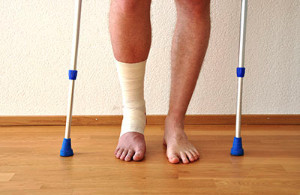 New York Giants middle linebacker B.J. Goodson injured his ankle during the Giants and Seahawks game. Goodson suffered the injury during the first half and was out for the rest of the game. Teammate Curtis Grant took over Goodson’s position as middle linebacker. The Giants ended up losing the game 24 to 7. As if the loss wasn’t bad enough for the Giants, they are currently hurting in the linebacker position, with both Calvin Munson and Jonathan Casillas injured.
New York Giants middle linebacker B.J. Goodson injured his ankle during the Giants and Seahawks game. Goodson suffered the injury during the first half and was out for the rest of the game. Teammate Curtis Grant took over Goodson’s position as middle linebacker. The Giants ended up losing the game 24 to 7. As if the loss wasn’t bad enough for the Giants, they are currently hurting in the linebacker position, with both Calvin Munson and Jonathan Casillas injured.
Sports related foot and ankle injuries require proper treatment before players can go back to their regular routines. For more information, contact Dr. Jordan Rachlin of Monroe Foot Care. Our doctor can provide the care you need to keep you pain-free and on your feet.
Sports Related Foot and Ankle Injuries
Foot and ankle injuries are a common occurrence when it comes to athletes of any sport. While many athletes dismiss the initial aches and pains, the truth is that ignoring potential foot and ankle injuries can lead to serious problems. As athletes continue to place pressure and strain the area further, a mild injury can turn into something as serious as a rupture and may lead to a permanent disability. There are many factors that contribute to sports related foot and ankle injuries, which include failure to warm up properly, not providing support or wearing bad footwear. Common injuries and conditions athletes face, including:
- Plantar Fasciitis
- Plantar Fasciosis
- Achilles Tendinitis
- Achilles Tendon Rupture
- Ankle Sprains
Sports related injuries are commonly treated using the RICE method. This includes rest, applying ice to the injured area, compression and elevating the ankle. More serious sprains and injuries may require surgery, which could include arthroscopic and reconstructive surgery. Rehabilitation and therapy may also be required in order to get any recovering athlete to become fully functional again. Any unusual aches and pains an athlete sustains must be evaluated by a licensed, reputable medical professional.
If you have any questions please feel free to contact our office located in Monroe, NY. We offer the newest diagnostic and treatment technologies for all your foot and ankle needs.
Read more about Sports Related Foot And Ankle InjuriesWeight-Loss Surgery Found to Improve Rheumatoid Arthritis Symptoms
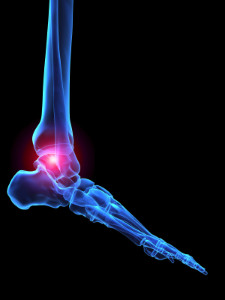 A recent study published in the Arthritis Care and Research journal found that those who are obese and have rheumatoid arthritis may benefit greatly from bariatric, or weight-loss, surgery. While the study needs more research before conclusive results can be firmly established, early statistics note huge improvements in patients. Out of the 53 patients who have rheumatoid arthritis (RA) and undergone bariatric surgery, only six percent were found to have moderate to severe disease activity 12 months after surgery. Six years after having the surgery, 74 percent of the patients were classified as being in remission. This contrasted with the only 24 percent achieving remission with RA medications before surgery. While these results are excellent, there are many factors that are unknown; one such factor is whether bariatric surgery is more effective in reducing RA symptoms than diet and exercise. Furthermore, bariatric surgery may potentially lead to osteoporosis, a condition characterized by weak and brittle bones.. Ultimately, for those who have RA, are obese, and considering bariatric surgery, there are many factors that have to be taken into account. If you are overweight and suffer from arthritic pain in your feet, consulting with a podiatrist is recommended.
A recent study published in the Arthritis Care and Research journal found that those who are obese and have rheumatoid arthritis may benefit greatly from bariatric, or weight-loss, surgery. While the study needs more research before conclusive results can be firmly established, early statistics note huge improvements in patients. Out of the 53 patients who have rheumatoid arthritis (RA) and undergone bariatric surgery, only six percent were found to have moderate to severe disease activity 12 months after surgery. Six years after having the surgery, 74 percent of the patients were classified as being in remission. This contrasted with the only 24 percent achieving remission with RA medications before surgery. While these results are excellent, there are many factors that are unknown; one such factor is whether bariatric surgery is more effective in reducing RA symptoms than diet and exercise. Furthermore, bariatric surgery may potentially lead to osteoporosis, a condition characterized by weak and brittle bones.. Ultimately, for those who have RA, are obese, and considering bariatric surgery, there are many factors that have to be taken into account. If you are overweight and suffer from arthritic pain in your feet, consulting with a podiatrist is recommended.
Because RA affects more than just your joints, including the joints in your feet and ankles, it is important to seek early diagnosis from your podiatrist if you feel like the pain in your feet might be caused by RA. For more information, contact Dr. Jordan Rachlin of Monroe Foot Care. Our doctor will assist you with all of your podiatric concerns.
What Is Rheumatoid Arthritis?
Rheumatoid Arthritis (RA) is an autoimmune disorder in which the body’s own immune system attacks the membranes surrounding the joints. Inflammation of the lining and eventually the destruction of the joint’s cartilage and bone occur, causing severe pain and immobility.
Rheumatoid Arthritis of the Feet
Although RA usually attacks multiple bones and joints throughout the entire body, almost 90 percent of cases result in pain in the foot or ankle area.
Symptoms
- Swelling and pain in the feet
- Stiffness in the feet
- Pain on the ball or sole of feet
- Joint shift and deformation
Diagnosis
Quick diagnosis of RA in the feet is important so that the podiatrist can treat the area effectively. Your doctor will ask you about your medical history, occupation, and lifestyle to determine the origin of the condition. Rheumatoid Factor tests help to determine if someone is affected by the disease.
If you have any questions please feel free to contact our office located in Monroe, NY. We offer the newest diagnostic and treatment technologies for all your foot and ankle needs.
Read more about Rheumatoid Arthritis in the FeetTaking Care of Your Feet
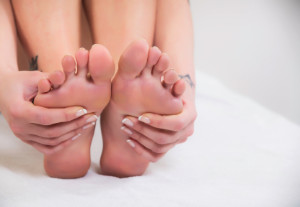 Our feet allow us to do so much, yet they are often neglected or overlooked. Therefore it is important for us to take good care of them. Wearing proper footwear is just one of the ways we can take care of our feet. Look for shoes that are comfortable and provide enough room inside. Shoes that are tight or that force the foot into an uncomfortable position, such as heels, can cause a number of health problems such as plantar fasciitis and corns. If you experience sweaty feet, use foot powder and switch socks often to prevent conditions like athlete’s foot or toenail fungus. Washing your feet will keep them clean and also help stave off certain foot ailments. If your feet hurt, giving yourself a massage by rubbing them in circular motions with your hands can help relieve some tension. If pain is constant or chronic, however, see a podiatrist for help. Finally, if you paint your nails, avoid using nail polish and polish remover containing harsh chemicals.
Our feet allow us to do so much, yet they are often neglected or overlooked. Therefore it is important for us to take good care of them. Wearing proper footwear is just one of the ways we can take care of our feet. Look for shoes that are comfortable and provide enough room inside. Shoes that are tight or that force the foot into an uncomfortable position, such as heels, can cause a number of health problems such as plantar fasciitis and corns. If you experience sweaty feet, use foot powder and switch socks often to prevent conditions like athlete’s foot or toenail fungus. Washing your feet will keep them clean and also help stave off certain foot ailments. If your feet hurt, giving yourself a massage by rubbing them in circular motions with your hands can help relieve some tension. If pain is constant or chronic, however, see a podiatrist for help. Finally, if you paint your nails, avoid using nail polish and polish remover containing harsh chemicals.
Everyday foot care is very important to prevent infection and other foot ailments. If you need your feet checked, contact Dr. Jordan Rachlin from Monroe Foot Care. Our doctor can provide the care you need to keep you pain-free and on your feet.
Everyday Foot Care
Often, people take care of their bodies, face and hair more so than they do for their feet. But the feet are a very important aspect of our bodies, and one that we should pay more attention to. Without our feet, we would not be able to perform most daily tasks.
It is best to check your feet regularly to make sure there are no new bruises or cuts that you may not have noticed before. For dry feet, moisturizer can easily be a remedy and can be applied as often as necessary to the affected areas. Wearing shoes that fit well can also help you maintain good foot health, as well as making it easier to walk and do daily activities without the stress or pain of ill-fitting shoes, high heels, or even flip flops. Wearing clean socks with closed shoes is important to ensure that sweat and bacteria do not accumulate within the shoe. Clean socks help to prevent Athlete’s foot, fungi problems, bad odors, and can absorb sweat.
If you have any questions please feel free to contact our office located in Monroe, NY. We offer the newest diagnostic and treatment technologies for all your foot and ankle needs.
Read more about Every Day Foot CareThe Elderly and Foot Health
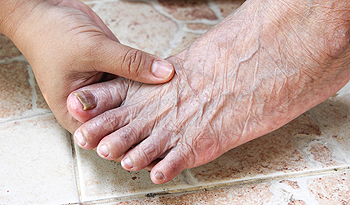 Taking good care of your feet becomes more important as you get older. Age tends to exacerbate foot issues, with many people over the age of 65 reportedly suffering from foot pain. Another common issue among the elderly is diabetes. Diabetes causes neuropathy, or nerve loss, in the lower body, especially in the feet. Diabetics suffer from poor blood circulation in the legs and feet as well. This means that if a diabetic sustains a wound, they may not realize it due to loss of sensation, and the wound may not heal properly. In severe cases, amputation may be necessary if the infection significantly worsens. Because of this, elderly diabetics need to take extra care of their feet, though most elderly people will also benefit from practicing good foot health. Good foot health strategies include daily foot inspections for any abnormalities, washing and drying the feet, keeping one's diabetes in check, and wearing quality socks and footwear that will protect the feet and provide ample foot support. Finally, performing a check-up with a podiatrist yearly is also recommended.
Taking good care of your feet becomes more important as you get older. Age tends to exacerbate foot issues, with many people over the age of 65 reportedly suffering from foot pain. Another common issue among the elderly is diabetes. Diabetes causes neuropathy, or nerve loss, in the lower body, especially in the feet. Diabetics suffer from poor blood circulation in the legs and feet as well. This means that if a diabetic sustains a wound, they may not realize it due to loss of sensation, and the wound may not heal properly. In severe cases, amputation may be necessary if the infection significantly worsens. Because of this, elderly diabetics need to take extra care of their feet, though most elderly people will also benefit from practicing good foot health. Good foot health strategies include daily foot inspections for any abnormalities, washing and drying the feet, keeping one's diabetes in check, and wearing quality socks and footwear that will protect the feet and provide ample foot support. Finally, performing a check-up with a podiatrist yearly is also recommended.
Proper foot care is something many older adults forget to consider. If you have any concerns about your feet and ankles, contact Dr. Jordan Rachlin from Monroe Foot Care. Our doctor can provide the care you need to keep you pain-free and on your feet.
The Elderly and their Feet
As we age we start to notice many changes in our body, but the elder population may not notice them right away. Medical conditions may prevent the elderly to take notice of their foot health right away. Poor vision is a lead contributor to not taking action for the elderly.
Common Conditions
- Neuropathy – can reduce feeling in the feet, and can hide many life threating medical conditions.
- Reduced flexibility – prevents the ability of proper toenail trimming, and foot cleaning. If left untreated, it may lead to further medical issues.
- Foot sores – amongst the older population can be serious before they are discovered. Some of the problematic conditions they may face are:
- Gouging toenails affecting nearby toe
- Shoes that don’t fit properly
- Pressure sores
- Loss of circulation in legs & feet
- Edema & swelling of feet and ankles
Susceptible Infections
Diabetes and poor circulation can cause general loss of sensitivity over the years, turning a simple cut into a serious issue.
If you have any questions please feel free to contact our office located in Monroe, NY. We offer the newest diagnostic and treatment technologies for all your foot and ankle needs.
Read more about Elderly and their FeetMore...
How to Prevent Stress Fractures
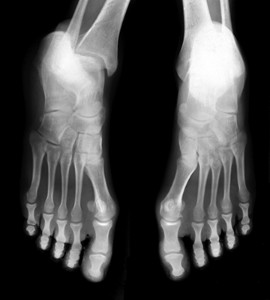 Stress fractures are small cracks in the bone typically caused by repetitive force or stress. While they can occur in various areas of the body, stress fractures are more likely to occur in the foot due to it having to bear weight and having to sustain repeated strikes. They can be very painful and often take time to properly heal. To avoid dealing with stress fractures, practice methods to prevent them from occurring. If you are starting a new physical activity, prevent stress fractures by taking it slowly and gradually increasing intensity and duration. This prevents overuse and allows your body to acclimate to physical stress. Footwear that provides proper support can improve your running style and prevent stress fractures. The surfaces you run on can also affect your risk for injury. Soft surfaces like grass can be more forgiving than harder surfaces like concrete. If you have questions about stress fractures and whether running is right for you, ask a podiatrist.
Stress fractures are small cracks in the bone typically caused by repetitive force or stress. While they can occur in various areas of the body, stress fractures are more likely to occur in the foot due to it having to bear weight and having to sustain repeated strikes. They can be very painful and often take time to properly heal. To avoid dealing with stress fractures, practice methods to prevent them from occurring. If you are starting a new physical activity, prevent stress fractures by taking it slowly and gradually increasing intensity and duration. This prevents overuse and allows your body to acclimate to physical stress. Footwear that provides proper support can improve your running style and prevent stress fractures. The surfaces you run on can also affect your risk for injury. Soft surfaces like grass can be more forgiving than harder surfaces like concrete. If you have questions about stress fractures and whether running is right for you, ask a podiatrist.
Activities where too much pressure is put on the feet can cause stress fractures. To learn more, contact Dr. Jordan Rachlin from Monroe Foot Care. Our doctor can provide the care you need to keep your pain free and on your feet.
Dealing with Stress Fractures of the Foot and Ankle
Stress fractures occur in the foot and ankle when muscles in these areas weaken from too much or too little use. The feet and ankles then lose support when walking or running from the impact of the ground. Since there is no protection, the bones receive the full impact of each step. Stress on the feet can cause cracks to form in the bones, thus creating stress fractures.
What are Stress Fractures?
Stress fractures occur frequently in individuals whose daily activities cause great impact on the feet and ankles. Stress factors are most common among:
- Runners
- People affected with Osteoporosis
- Tennis or basketball players
- Gymnasts
- High impact workouts
Symptoms
Pain from the fractures occur in the area of the fractures and can be constant or intermittent. It will often cause sharp or dull pain with swelling and tenderness. Engaging in any kind of activity which involves high impact will aggravate pain.
If you have any questions please feel free to contact our office located in Monroe, NY. We offer the newest diagnostic and treatment technologies for all your foot and ankle needs.
Read more about Dealing with Stress Fractures of the Foot and AnkleDiet and Gout
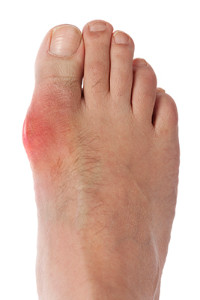 Gout, a form of arthritis caused by uric acid crystals forming in joints, can be very painful and can occur in any joint in the body. Thankfully, gout can be managed with a good diet. Avoiding high intakes of acid-rich food is advised. Purines, which are converted into uric acid by the body, come from animal and plant foods. Purine-rich diets, especially from meat and seafood, increase the risk of gout attacks. While not completely preventing gout attacks, diets with plenty of vegetables do help. Low-fat dairy products have been found to prevent uric acid buildup as well. Alcohol has also been linked with dramatically increased rates of gout attacks, so cutting back on alcohol is a great way to prevent gout attacks. While improving your diet won’t eliminate gout, it will certainly help to lessen attacks and their effects.
Gout, a form of arthritis caused by uric acid crystals forming in joints, can be very painful and can occur in any joint in the body. Thankfully, gout can be managed with a good diet. Avoiding high intakes of acid-rich food is advised. Purines, which are converted into uric acid by the body, come from animal and plant foods. Purine-rich diets, especially from meat and seafood, increase the risk of gout attacks. While not completely preventing gout attacks, diets with plenty of vegetables do help. Low-fat dairy products have been found to prevent uric acid buildup as well. Alcohol has also been linked with dramatically increased rates of gout attacks, so cutting back on alcohol is a great way to prevent gout attacks. While improving your diet won’t eliminate gout, it will certainly help to lessen attacks and their effects.
Gout is a foot condition that requires certain treatment and care. If you are seeking treatment, contact Dr. Jordan Rachlin from Monroe Foot Care. Our doctor will treat your foot and ankle needs.
What is Gout?
Gout is a type of arthritis caused by a buildup of uric acid in the bloodstream. It often develops in the foot, especially the big toe area, although it can manifest in other parts of the body as well. Gout can make walking and standing very painful and is especially common in diabetics and the obese.
People typically get gout because of a poor diet. Genetic predisposition is also a factor. The children of parents who have had gout frequently have a chance of developing it themselves.
Gout can easily be identified by redness and inflammation of the big toe and the surrounding areas of the foot. Other symptoms include extreme fatigue, joint pain, and running high fevers. Sometimes corticosteroid drugs can be prescribed to treat gout, but the best way to combat this disease is to get more exercise and eat a better diet.
If you have any questions please feel free to contact our office located in Monroe, NY. We offer the newest diagnostic and treatment technologies for all your foot and ankle needs.
Read more about Everything You Need to Know About GoutWhat are Bunions?
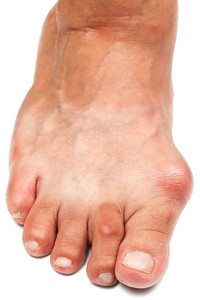 Hallux valgus, better known as bunions, is an enlargement of the inner portion of the joint at the base of the big toe. This can cause pain, tenderness, and redness near the big toe. Movement can worsen the pain, and overtime, the misalignment can become worse. Several conditions have been linked to bunions, with genetics playing a role as well. These include flat feet, obesity, abnormal bone structures, and overly flexible ligaments. Those of European descent are more likely to suffer from bunions. Shoes that aren’t wide enough and high heels can exacerbate bunions. While not all bunions require surgery, it is important to see a podiatrist first who can observe the severity of the deformation and provide treatment.
Hallux valgus, better known as bunions, is an enlargement of the inner portion of the joint at the base of the big toe. This can cause pain, tenderness, and redness near the big toe. Movement can worsen the pain, and overtime, the misalignment can become worse. Several conditions have been linked to bunions, with genetics playing a role as well. These include flat feet, obesity, abnormal bone structures, and overly flexible ligaments. Those of European descent are more likely to suffer from bunions. Shoes that aren’t wide enough and high heels can exacerbate bunions. While not all bunions require surgery, it is important to see a podiatrist first who can observe the severity of the deformation and provide treatment.
If you are suffering from bunions, contact Dr. Jordan Rachlin of Monroe Foot Care. Our doctor can provide the care you need to keep you pain-free and on your feet.
What is a Bunion?
A bunion is formed of swollen tissue or an enlargement of boney growth, usually located at the base joint of the toe that connects to the foot. The swelling occurs due to the bones in the big toe shifting inward, which impacts the other toes of the foot. This causes the area around the base of the big toe to become inflamed and painful.
Why do Bunions Form?
Genetics – Susceptibility to bunions are often hereditary
Stress on the feet – Poorly fitted and uncomfortable footwear that places stress on feet, such as heels, can worsen existing bunions
How are Bunions Diagnosed?
Doctors often perform two tests – blood tests and x-rays – when trying to diagnose bunions, especially in the early stages of development. Blood tests help determine if the foot pain is being caused by something else, such as arthritis, while x-rays provide a clear picture of your bone structure to your doctor.
How are Bunions Treated?
- Refrain from wearing heels or similar shoes that cause discomfort
- Select wider shoes that can provide more comfort and reduce pain
- Anti-inflammatory and pain management drugs
- Orthotics or foot inserts
- Surgery
If you have any questions, please feel free to contact our office located in Monroe, NY. We offer the newest diagnostic and treatment technologies for all your foot care needs.
Read more about BunionsGiants Player Odell Beckham Suffers Ankle Sprain
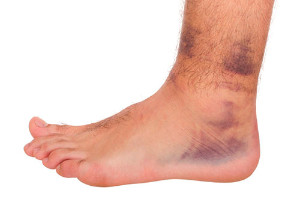 Wide receiver Odell Beckham of the New York Giants recently suffered an ankle sprain during a game against the Cleveland Browns. Beckham jumped up for a catch but when he came down, Browns cornerback Briean Boddy-Calhoun hit him in the leg. He was able to walk off the field on his own but was later seen on the sidelines in pain. An X-ray revealed that it was either a rolled ankle or a sprain. Beckham will be tested further back in New York. He is confident he won’t be off the field for long and will be back in time when the season starts.
Wide receiver Odell Beckham of the New York Giants recently suffered an ankle sprain during a game against the Cleveland Browns. Beckham jumped up for a catch but when he came down, Browns cornerback Briean Boddy-Calhoun hit him in the leg. He was able to walk off the field on his own but was later seen on the sidelines in pain. An X-ray revealed that it was either a rolled ankle or a sprain. Beckham will be tested further back in New York. He is confident he won’t be off the field for long and will be back in time when the season starts.
Sports related foot and ankle injuries require proper treatment before players can go back to their regular routines. For more information, contact Dr. Jordan Rachlin of Monroe Foot Care. Our doctor can provide the care you need to keep you pain-free and on your feet.
Sports Related Foot and Ankle Injuries
Foot and ankle injuries are a common occurrence when it comes to athletes of any sport. While many athletes dismiss the initial aches and pains, the truth is that ignoring potential foot and ankle injuries can lead to serious problems. As athletes continue to place pressure and strain the area further, a mild injury can turn into something as serious as a rupture and may lead to a permanent disability. There are many factors that contribute to sports related foot and ankle injuries, which include failure to warm up properly, not providing support or wearing bad footwear. Common injuries and conditions athletes face, including:
- Plantar Fasciitis
- Plantar Fasciosis
- Achilles Tendinitis
- Achilles Tendon Rupture
- Ankle Sprains
Sports related injuries are commonly treated using the RICE method. This includes rest, applying ice to the injured area, compression and elevating the ankle. More serious sprains and injuries may require surgery, which could include arthroscopic and reconstructive surgery. Rehabilitation and therapy may also be required in order to get any recovering athlete to become fully functional again. Any unusual aches and pains an athlete sustains must be evaluated by a licensed, reputable medical professional.
If you have any questions please feel free to contact our office located in Monroe, NY. We offer the newest diagnostic and treatment technologies for all your foot and ankle needs.
Read more about Sports Related Foot And Ankle InjuriesLocation & Hours
1200 Rt 208 Suite 5
Monroe, NY 10950
Directions
Phone: (845) 782-4455
Fax: (800) 968-8601
Monday through Thursday - 8am to 6pm
Friday - 8am - 3pm
Services
Foot and Ankle Pain- Ingrown toenail care
- Sport Medicine
- Medical Grade Orthotics
- Trauma and Sprain Care
- Medical Pedicures
- Plantar Fascitis
- Achilles Tendonitis
- Broken Toe
Copyright © 2015 Monroe Foot Care | Site Map | Design by: Podiatry Content Connection
